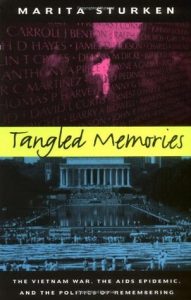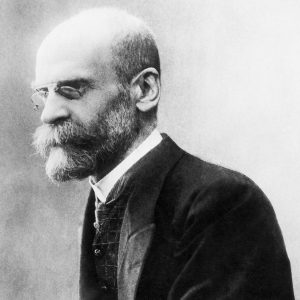
Communications scholar Marita Sturken states in the introduction of her book, Tangled Memories:
“I think it important to take note of those moments when people perceive themselves to be participants in the nation. One of the ways in which this happens is through the media. When Americans watch events of “national” importance— the Persian Gulf War, the Anita Hill/Clarence Thomas hearings, the explosion of the Challenger— on television, they perceive themselves to be part of a national audience regardless of their individual political views or cultural background. Citizenship can thus be enacted through live television.” (pp. 13-14)
 I am reminded of Émile Durkheim’s ideas from Religion and Ritual, which we studied in my Sociology 102 class. In it, he describes the function religions and nations have in common, of bringing together a conscience collective in their members, a feeling of community and common goals. He says rituals and assemblies bind people, reaffirm interests and meaning for the group, and through heightened emotions, renew group commitment. I am curious if Sturken was at all influenced by studying Durkheim directly, as he is known as a founder of modern social science and father of sociology, which often overlaps with a discipline such as communications. I always thought of his ideas of ritual and assembly as positive events, but the connection with Sturken’s examples of traumatic events watched collectively, makes me reconsider the issue in terms of sociological framework combined with narrative.
I am reminded of Émile Durkheim’s ideas from Religion and Ritual, which we studied in my Sociology 102 class. In it, he describes the function religions and nations have in common, of bringing together a conscience collective in their members, a feeling of community and common goals. He says rituals and assemblies bind people, reaffirm interests and meaning for the group, and through heightened emotions, renew group commitment. I am curious if Sturken was at all influenced by studying Durkheim directly, as he is known as a founder of modern social science and father of sociology, which often overlaps with a discipline such as communications. I always thought of his ideas of ritual and assembly as positive events, but the connection with Sturken’s examples of traumatic events watched collectively, makes me reconsider the issue in terms of sociological framework combined with narrative.
I have been confused yet fascinated ever since I was a little kid by the idea of the Olympics as a source of national pride for the average citizen. Okay, so this one stranger who grew up across the country from me is the best swimmer this year—of the few who were deemed worthy to compete, that is—and somehow that should give me personally a sense of superiority over members of other nations? I am supposed to connect with all the other Canadians watching this race, and see us reflected in it, even though it truly has nothing to do with us. That is just one athlete who is extremely talented and dedicated, who knows very few of the people who are extremely invested in their performance.
And though I didn’t (and still really don’t) understand or agree with the notion of the importance for the country, I still felt it, to some degree, and in some situations, I still do. I was raised to believe that nationalism is, in the overwhelming number of situations, a bad thing. It causes wars, discrimination, and lessens empathy. It gets in the way of us remembering that we are all human, more similar than different. Yet in a sport I care about, I want a Canadian to win.
This is extremely similar to the experience Sturken describes, as we acutely feel in those moments, that we are intrinsically members of a nation, not necessarily due to connection with the event itself, but because of connection with the entire audience. The situation may have the feeling of nationwide anticipation in common, but not such feelings of fear or potentially devastating stakes.
I still don’t understand why certain events become symbols of nationalism, when they don’t have to be, and when others don’t. What really brought the issue of nationalism in sports competitions forward for me recently was watching the absurd obstacle course TV show Ultimate Beastmaster on Netflix, where athletes from nine countries compete on an extreme parkour-like obstacle course dubbed “The Beast”. It is a fun show demonstrating extreme athleticism, which is why I watch it. But it is presented as a battle of nations, with athletes representing the overall strength and might of their home country. This aspect baffles me. Why do we continue to create new situations to feed into what to me is an unhelpful display and force of nationalism when it could easily not have that element at all. Do we actually crave the elation of that connection that comes from nationalism and these rituals? Or is it simply so ingrained in the culture that it has become second nature to look at everything through the lensof national superiority? I feel like the constant barrage of it is furthering someone’s goals, but not those of the citizens who get so swept up in it all.
others don’t. What really brought the issue of nationalism in sports competitions forward for me recently was watching the absurd obstacle course TV show Ultimate Beastmaster on Netflix, where athletes from nine countries compete on an extreme parkour-like obstacle course dubbed “The Beast”. It is a fun show demonstrating extreme athleticism, which is why I watch it. But it is presented as a battle of nations, with athletes representing the overall strength and might of their home country. This aspect baffles me. Why do we continue to create new situations to feed into what to me is an unhelpful display and force of nationalism when it could easily not have that element at all. Do we actually crave the elation of that connection that comes from nationalism and these rituals? Or is it simply so ingrained in the culture that it has become second nature to look at everything through the lensof national superiority? I feel like the constant barrage of it is furthering someone’s goals, but not those of the citizens who get so swept up in it all.
However, I do have some perspective in this situation: there were no Canadians in Beastmaster, so I felt it was ridiculous to see these different nations drawing lines of teams and enemies when they could all be supporting each other. All the different nation’s presenters and athletes, however, seemed to be having lots of fun with all the competition.
The Olympics I understand more, but not much, probably because it is such a traditional event that I feel the stakes of more. It just doesn’t seem very helpful, or innocent. Sturken’s idea of national participation in a less competitive and comparative sense I can get behind as having a clear function of building community. When it comes to putting high emotions behind a competition whose sole purpose is to pit the world’s people against each other, though, I get a more sinister feeling, despite the relative inconsequentiality of it all.
Hi Jaqi! This was a great post. I share some of your…er…confusion about the Olympics. It’s interesting, too, that the way nations “come together” in these instances is by battling each other…